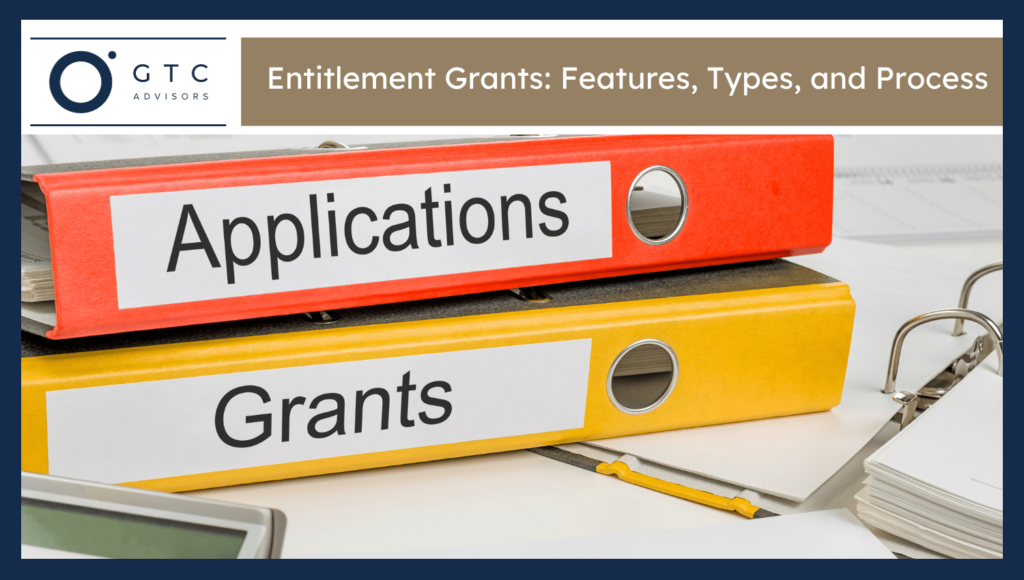Entitlement grants are the government funds given to the eligible people, groups or institutions under certain laws or formulas. Such grants are not competitive; applicants who have the needed requirements get the money. These are often given as grants such as education, healthcare or public services. Entitlement grants provide maintenance of necessary programs and are commonly utilised in order to facilitate inequality, the low-income population, or basic publicly-provided services. The amount received is based on eligibility, size of population or other standardised measures defined by law.
What Are the Key Features of Entitlement Grants?
Here are four key features:
- Formula-Based Allocation refers to the circumstances under which funds are allocated by formulas depending on such factors as population, income, or service requirements.
- Guaranteed Access ensures that everyone who meets the legal requirements gets funding regardless of competition among applicants.
- Ongoing Support provides regular funding to keep up with necessities like education, healthcare, or welfare programs.
- Regulated Use involves extremely strict compliance with the guidelines, restricting spending and tracking of the funds.
What Are the Common Types of Entitlement Grants?
Below are the five types of entitlement grants:
Medicaid
Medicaid provides health care services to low-income families and individuals. It is funded by both the federal and state governments and administered at the state level. The program includes basic medical expenses, including hospitalisation, visits to a doctor and long-term care.
Social Security
The Social Security program provides retirement benefits, disability income, and financial protection. Monthly payments are issued to those deserving depending on their earning record and individual requirements.
Medicare
Medicare is a federal health grant scheme that targets individuals above 65 years of age or individuals with disabilities. It has various components, including hospital care, medical care and prescription drugs.
Unemployment Insurance
The Unemployment Insurance offers short-term financial aid to people who have lost their jobs accidentally. Employer payroll taxes fund it, which is shared by the federal government and the state governments. Recipients are required to pass eligibility requirements and actively find new jobs.
Title I Grants (Education)
Title I Grants are offered to the schools that have a large number of students whose families are low-income. This money is spent on programs that enhance academic performance and bridge educational disparity. The money can be utilised in education through tutoring, extra staff, or educational materials.
What Is the Application Process for Entitlement Grants?
Below are the five steps for applying for the entitlement grants:
Eligibility Determination
The initial step is to determine the eligibility of the individual or organisation using the criteria set by the federal or state government. The basis of these criteria generally includes income, age, disability, or the population group to be served.
Automatic or Formula-Based Allocation
After eligibility is determined, funds are granted automatically or by a fixed formula. The process also allows deserving applicants to get support without competing for limited funds.
Documentation Submission
The applicants are required to submit the relevant documentation in order to qualify. This can be income statements, identification, previous service or organisational information, depending on the nature of the grant.
Program Registration
The qualified candidates are then enrolled in the suitable program. It can include making an account, selecting benefit plan choices, or participating in online or physical enrollment processes.
Continuous Reporting and Compliance
The beneficiaries have to follow the rules of the program and provide regular reports to maintain eligibility. It ensures proper use of funds and continued access to benefits.
Who Can Apply for Entitlement Grants?
Here are the four main types of applicants:
- State and Local Governments get entitlement grants to help fund state and local programs such as education, health services, and community development.
- Depending on factors like income, age, or others, Individuals can claim grants like Social Security, Medicare, or student aid.
- The Educational Institutions are granted in support of equal access to education, primarily to underserved or low-income populations of students.
- Nonprofit Agencies, in particular programs, can receive some entitlement funds to provide approved services under federal or state programs.

George C. Tagg, Jr.
George serves as a trusted counsel to business leaders, non-profit executives, and management teams. George is a licensed attorney with a master’s in international affairs and over 20 years’ experience in the U.S. Congress, Department of State, Department of Defense, global public policy, and political campaigns.


